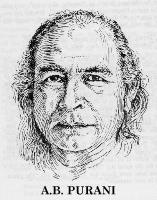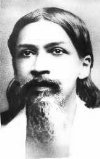6 September 1926
(second part of the talk)
Nota:The word "Disciple"
does not mean always the same person
Disciple: You said about the forces that control money that
two conditions were necessary. First, one must be very calm and must
not get disturbed and have no desire for money. Secondly, it requires
a bojhapada ( = an understanding) with the universal forces.
What is this understanding?
Sri Aurobindo: There are many ways. Even in the case of one
man there are different methods, I mean in the yogic sense, which
he can follow. First, you must put your need before God and ask him
to satisfy it; your duty ends there. In that case you need not have
any bojhapada - understanding - with the universal forces.
But we look upon money as a power for the Divine, and, as with everything
else, we want to conquer it for the Divine in life. Hence, in our
case an "understanding" is necessary. As the money-power
to-day is in the hands of the hostile forces, naturally, we have to
fight them. Whenever they see that you are trying to oust them they
will try to thwart your efforts. You have to bring a higher power
than these and put them down. First, they try to trick you by offering
success, - one can say, by tying to buy you up. If a man falls into
that trap then his spiritual future is ruined.
You have really to follow a certain rhythm of the money-power, the
rhythm that brings in and the one that throws out money. Money is
given to you in the beginning; then, you have to deserve it. You have
to prove that you do not waste it. If you waste it, then you lose
your right to it.
Disciple: What is waste?
Sri Aurobindo: Waste is waste. Throwing away money without
any order, unorganised expenses without regard to the means of getting
money or to the utility of spending. It is not that you have to hoard
money. It is there for being spent. But we must spend it in the right
way - in a certain order and with an arrangement.
Sometimes the Divine even follows man's caprices, as is typified in
the case of men like Thakur Dayananda.
Disciple: Yes. Whatever he gets must be spent away on that
very day, that is the rule; and they all wait till they get their
next day's food.
Sri Aurobindo: The result is that sometimes for seven days
they get so much food that they can't eat and then for fifteen days
they have to starve!
Disciple: Even the young children go without food for that
period.
Sri Aurobindo: Well, that is a chaotic movement; but he follows
it!
Disciple: Even the industrial magnates who get money get into
that rhythm of which you spoke.
Sri Aurobindo: Of course, they do, otherwise they can't get
rich. They take it in and then again they throw it out, then it returns
and again it is thrown out. That is the reason why they get colossal
wealth. These rich people often have no attachment to money, it is
the action of the vital force that they enjoy, not their money.
Disciple: It is a life-movement.
Sri Aurobindo: Yes. That was the ideal of the Vaishya as opposed
to the Bania - the miser. The Vaishya was the man who could get tremendous
wealth and could spend it liberally, could establish the interchange
and enter into the rhythm.
Disciple: But these Marwadis who are very rich are attached
to their wealth.
Sri Aurobindo: No.
Disciple: No, they are not. We think them greedy because they
don't give money in the way in which we want them to give. They generally
spend it in the old conventional way. We think them greedy also because
they are particular about small things in their business - caring
for pies.
Sri Aurobindo: It is very necessary. It is exactly that which
brings them the money.
Disciple: Henry Ford has also got that habit and so has become
rich. He describes in his biography how he started with the idea not
of making money but of giving people a quick conveyance at a small
price.
Sri Aurobindo: The Americans have got the knack of getting
into the rhythm which bring them money. The French method, for instance,
does not succeed because they follow out small narrow paths, while
the Americans boldly get into movement on a large scale and money
circulates and as it circulates it accumulates and increases life
wherever it flows.
Disciple: You said that some men have got in their vital being
a special capacity that draws money to them.
Sri Aurobindo: Yes. Some have it. And some women also have
got it. Women can give a tremendous push to a man in anything he does.
There are also women who are lakshmi-chara - those that take
away what you may have.
A.B. Purani
in "Evening Talks with Sri Aurobindo"
Third edition complete in one volume 1982
Chapter "On Sadhana" pages 336- 339
published by Sri
Aurobindo Ashram - Pondicherry
diffusion by SABDA

